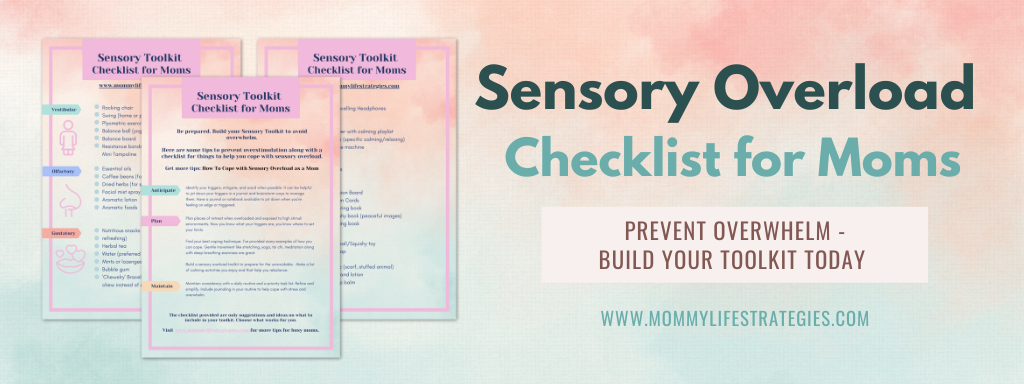
Many moms suffer from sensory overload. Maybe it’s the lack of sleep or coffee, but it could be that your sensory processing is overwhelmed.
Do you ever feel like this?
Irritable? The little things irritate you and might make you snap at your kids or spouse.
Anxious? Like you need to find a place to escape.
Poor focus? Like your brain feels scrambled and struggles to focus.
Overwhelmed? Like you need to close your eyes and plug your ears.
Sensitive? The clothes you’re wearing feel like sandpaper.
Exhausted? Always tired even after a cup (or two) of coffee and a good night’s sleep.
These are some feelings you might experience with sensory overwhelm.
If you want to avoid feeling overloaded and overstimulated, know your triggers.
Overstimulation is common among mothers, especially moms with small children. Do you feel guilty when you struggle to focus or when you’re sensitive?
You are not alone.
If you are wondering how sensory overload happens, it can happen because:
- You make yourself available 24/7.
- You get little support, doing much of the care on your own.
- You are overwhelmed with tasks and don’t know what to prioritize.
- You have less opportunity to recover.
- You are not prioritizing self-care.
Disclaimer: The Mommy Life Strategies blog does not provide medical advice, diagnosis, or treatment. Content from Mommy Life Strategies blog is not intended to be used for medical diagnosis or treatment. The information provided on this website is intended for informational purposes only. The information provided is not intended to be a substitute for professional medical advice.

What is Sensory Overload?
Think of it this way. Your brain is like a computer.
Information comes in, then it’s processed. After processing, it gives the body instructions on what to do with the information.
Your body then reacts to those instructions.
Sensory dysregulation is like an overfilling cup. If too much information is coming in, your brain will struggle to keep up, causing your body to overreact.
This leads to overwhelm.
If you are already stressed or fatigued, sensory processing will be worse.
Find out how to cope with the top seven sensory stresses you might encounter.
1.Noise
There’s no doubt that noise is an obvious trigger, but with kids there’s no escaping it.
If you’re overstimulated, what you normally tolerate will quickly become intolerable.
It can’t always be quiet, but if your auditory inputs are reaching its maximum, seek to reduce or eliminate any excessive noise.
Here are a few practical tips.
Ear plugs and noise canceling headphones
Simple but effective.
Ear plugs or headphones can block a lot, so it might pose a problem if you are supervising children. Cotton balls can offer decent noise reduction too, while still being able to hear. Don’t be afraid to use them if you need them.
Play calming music
Do you feel calm when listening to loud or fast-paced music? Great if you need a quick burst of energy, but probably not a good idea if you’re overstimulated.
Jazz or classical music can be a good choice to calm and rebalance an already frazzled sensory system.
Let kids play in another room
A separate area in your home like a dedicated playroom, bedroom, or family room can help reduce excess noise. You’re still close but not so close you hear the many decibels of high-pitch squeals and screams of kids playing.
Take advantage of the square footage in your home, dedicate some of it for a play and/or quiet space for you.
Encourage quiet activities
Quiet activities can still be fun, but can help you and your family recharge too. Some ideas include card games, art, crafting, reading, and tidying.
Make it a game if your kids are not on board with it. Challenge them to a competition to see who can play quietly for the longest.
Reduce the number of loud toys in the house if you can. For example, toys with flashing/strobe lights, loud sounds can be overwhelming for you and your kids.
If that’s not an option, you can rotate toys by putting them away in storage temporarily.
Take a break
It’s okay to take a break from the noise. If you can, get your spouse, family member or babysitter to watch your kids for an hour or two. Take that time to go for a walk or go somewhere quiet, like the library.
Avoid screens if possible. Scrolling social media or watching videos might seem like a break, but your visual and auditory senses are still being stimulated. When overloaded, reduce excess stimulation until you feel recharged.
2. Clingy kids
When you’re in that season of life with babies and young children, it can feel like they are stuck to you like Velcro.
The snuggles, hugs, and kisses you get from your kids are among the many joys of parenthood. Being a mom, you are also receiving touch and closeness through feeding, comforting, and playing.
As a mom you are constantly needed, and it can leave you feeling touched out.
When you reach this point, you need a break.
Choose a good time to discuss with your family that sometimes touch can be too overwhelming.
You might also want to talk about stress and personal space with your kids. This can serve as valuable for their well-being too.
The goal is to catch yourself before your breaking point. I believe that when mom is happy and healthy, so will the family. Take a no-touch break when you need it.
3. Environment
The environment you are in matters if you struggle with sensory overload.
Malls, playgrounds, amusement parks, and social gatherings can overwhelm the senses as they are high stimuli.
Avoid these types of environments when overloaded, if possible. Sometimes it’s unavoidable, like a family event or at the workplace, but you can still excuse yourself for a few minutes. Take a walk or sit on a bench to close your eyes can still make a difference.
The home and workplace can also be a source of overstimulation, especially if clutter is taking over.
Can’t find important documents because you have a shoebox filled with paper? Paper clutter can be a trigger. If you want to avoid this, identify the trigger in your home or workspace.
Less clutter will leave you less stressed and better regulated.
As you tune into your needs and are aware of your limits, sensory overload can be manageable.
4. No routine
Routines can make life simpler. It can help reduce overload by offering predictability and organization.
That is what you are aiming for, a daily routine that’s predictable not chaotic so you can stress less.
A bonus to creating a good routine is that it works for you and the rest of your family. Your children will appreciate the structure too.
5. No Me-Time
Your me-time can involve any activity that ‘fills your cup’. Choose activities that ease your senses and help you rebalance and recharge.
Some ideas are reading a novel by your favorite author, taking an art class, meditating, reconnecting with nature or relaxing in a dim-lit room.
Take some downtime to decompress.
Schedule your breaks and share them with your family. Make sure your me-time is uninterruptible.
6. No boundaries
Do you try to “tough it out” because you think that if you don’t, nothing will get done?
Pushing through the overwhelm rarely works.
Avoid trying to do it all, which can cause unnecessary stress and overstimulation.
Say No to unnecessary tasks and events. Instead, stick to your priorities and practice daily self-care to minimize sensory overload.
7. Poor Self-care
Self-care is not retail therapy or spa treatments. It’s more than that.
It prioritizes quality sleep, nutrition, movement, physical, hormonal, and mental health.
It’s practicing self-awareness. Knowing your limitations and accepting your season of life.
Consistent self-care keeps you resilient, making times of stress easier to manage.
If you are not prioritizing your health, sensory overload will be another stress to add to your list.
Include self-care in your daily routine. A good place to start is through journaling.
Curb overstimulation before it happens
There will be times when you miss the warning signs and you react negatively. Don’t feel guilty. Everyone has a limit to how much information we can process at a time.
You’re a busy mom juggling many plates. Overwhelm will happen.
The good news is that you can take steps to avoid it.
Don’t push through it. Prevent it.
Feeling irritable, anxious, overwhelmed, and exhausted are signs not to ignore.
Here are some tips to prevent sensory overwhelm.
Anticipate
Identify your triggers, mitigate, and avoid when possible. It can be helpful to jot down your triggers in a journal and brainstorm ways to manage them. Have a journal or notebook available to jot down when you’re feeling on edge or triggered.
Plan
Plan places of retreat when overloaded and exposed to high stimuli environments. Now you know what your triggers are, you know where to set your limits.
Find your best coping technique. I’ve provided many examples of how you can cope. Gentle movement like stretching, yoga, tai chi, meditation along with deep breathing exercises are great.
Build a sensory overload toolkit to prepare for the unavoidable. A toolkit can include earplugs, headphones, sunglasses, a stress ball, aromatherapy, and a change of clothes.
Make a list of calming activities you enjoy and that help you rebalance.
Maintain
Maintain consistency with a daily routine and a priority task list. Refine and simplify. Include journaling in your routine to help cope with stress and overwhelm.
Awareness and preparation go a long way and will help you be more resilient. Find your balance.
Remind yourself to take breaks. Although motherhood is difficult, it’s necessary to support your mental and physical health.
Never feel guilty for taking care of yourself. Rest and recover so you can function at your best.



